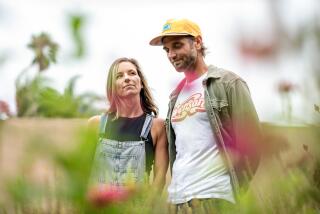A View From The Hill
- Share via
From a porch swing on the back deck of his Thousand Oaks home, Ray Albrecht looks northeast toward the Santa Susana Mountains that unfold into the distance in diminishing shades of blue and gray.
This is an exceptionally good day for viewing because autumn has turned the leaves of nearby liquid amber trees into glorious crimson gold, and brisk winds have brushed the skies into a brilliance that is almost blinding.
The view and the colors hold Albrecht for long moments because he knows more than most the transitory nature of times like this, of beauty and fulfillment that fly past like petals in a breeze. A few short months ago, he wasn’t sure if he would ever see this view again.
Albrecht, 64, had been told he was going to die. A heart damaged by childhood rheumatic fever was fading fast and in the blurred days leading to what he considers a miracle, he contemplated the sunrises from his home like a condemned man worshiping the last diagonals of light he would ever see.
It’s different now. Last October, Albrecht was given a new heart in a transplant operation that not only offered him life but more clearly defined life’s view from a hilltop in ways he hadn’t considered before.
In short, Ray Albrecht has been given a second chance to stop and perceive the distance.
Heart transplants aren’t new. The world’s first took place in 1967. Last year in the United States alone, surgeons performed 1,438. Not exactly as common as appendectomies, but they’re getting there.
The question of a transplant in Albrecht’s case arose after surgery to replace an aortic valve failed to halt the deterioration of his heart. He was given four months to live.
“They told me he would never get well,” his wife, Ruth, says. “After 42 years of marriage, I had to begin to think of what it would be like to be a widow.”
“It got so bad,” Albrecht says, “I couldn’t go up and down my hill or trim a tree or even get up off the couch. I’m a Christian and not afraid to die, but still I wanted to stay on the Earth just a little bit longer.”
He’s a frail man with a quick smile and a hesitant manner, huddled in a sweater on a day edged with the snap of fall. Ruth is outgoing and friendly, managing to balance hope and reality with amiable equanimity. They have three grown children and seven grandchildren. Close family ties are evidenced by photographs that appear in abundance throughout the small, well-kept home.
“I saw an X-ray of his heart,” Ruth says. “It was so enlarged it filled his chest. I didn’t see how he could make it. He knew it too, but there was never any ‘dying man’ instructions like sell the car, or that sort of thing.”
Ray adds, “I did say that if I died I wanted a closed casket and only a simple graveside service. I didn’t even want that but I figured Ruth probably would.”
A heart transplant was arranged through L.A.’s St. Vincent Medical Center. Albrecht was their first transplant patient. A donor heart--that of a 29-year-old man--was found on the morning of Oct. 18 and the successful transplant performed the same day. The operation took six hours.
“He went into surgery at 9 o’clock that night,” his wife says. “At 2:30 a.m. they came out and told me the heart was in and beating.”
Albrecht’s first words to Ruth when he opened his eyes the next morning were, “Well, I made it.”
A retired building inspector for the city of Thousand Oaks, Ray insists that he is not an articulate man and has trouble isolating his feelings about the transplant operation. But there is poetry even so in a new view of life that the transplant has made possible.
“People ask me about the future,” he says, shaking his head slightly, “but how can I talk about tomorrow when I still don’t understand today?”
Then: “I’m not down to Earth yet. I was sick for so long and then suddenly . . . well, I’m still falling out of the sky. My brain hasn’t caught up with my heart.”
I stood with Albrecht and his wife overlooking their view of the mountains. “When I came home from the hospital I tried to absorb everything at once,” he said. “The hills, the trees, it all looked so good I wanted to holler that I was home and I had a new heart.”
“Our days are all numbered,” Ruth added, “but in Ray’s case, the number has grown.”
I thought about them as I drove away. Leaves danced in the wind before my car. Sunlight bathed the dry hills in shimmering acrylics. Ray was right. It was a glorious day to be alive.
More to Read
Sign up for The Wild
We’ll help you find the best places to hike, bike and run, as well as the perfect silent spots for meditation and yoga.
You may occasionally receive promotional content from the Los Angeles Times.






